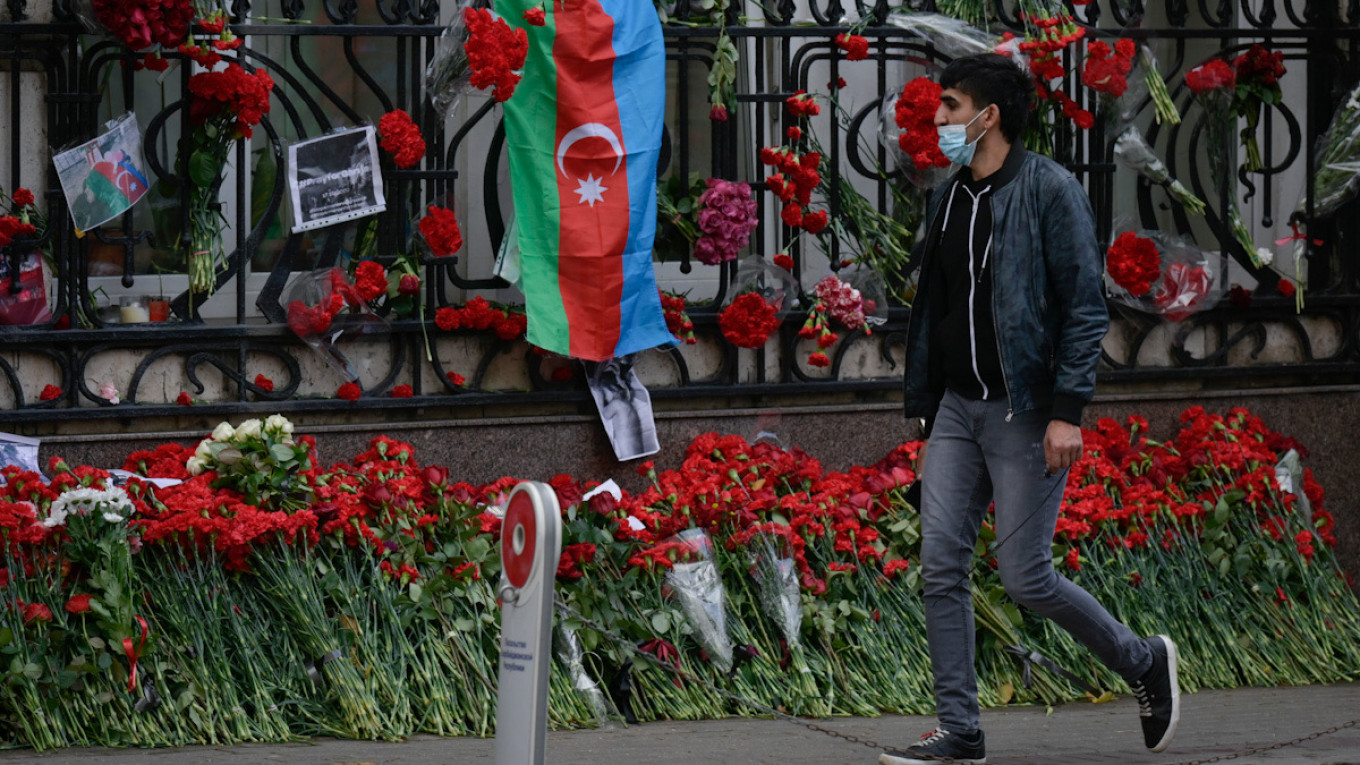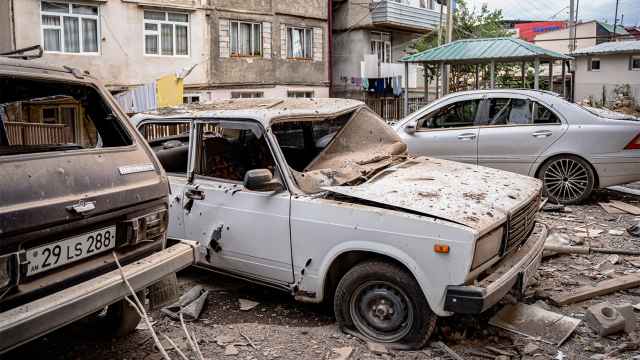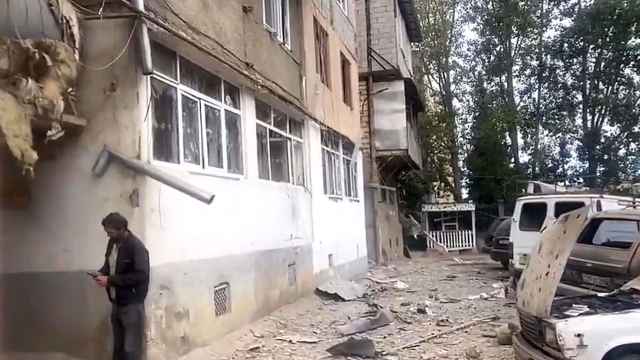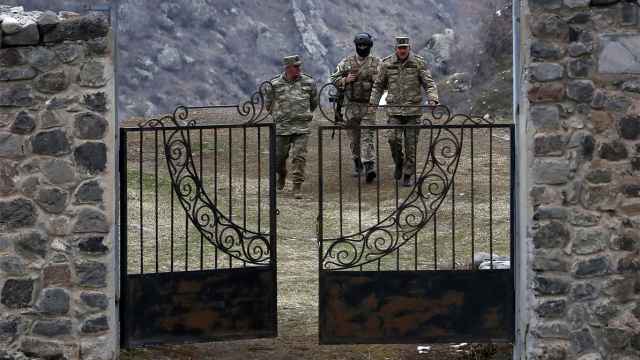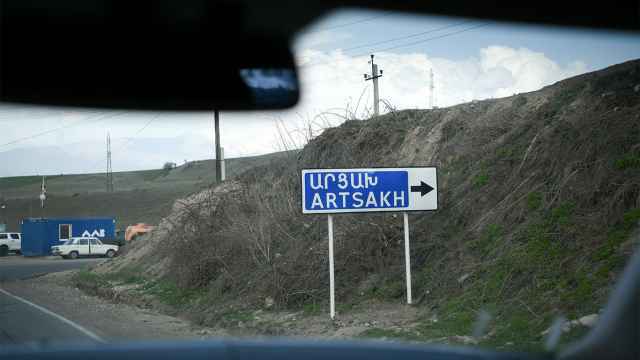At a bustling produce market in southwest Moscow, Azerbaijani salesman Avas' fruit and vegetables kiosk is a few steps away from Armine's where she sells cheese from Armenia.
When Avas was 26 years old, conflict broke out between Armenia and Azerbaijan over the disputed Nagorno-Karabakh region and he was forced to leave his home.
The early 1990s war between the two ex-Soviet rivals killed around 30,000 people, displaced hundreds of thousands and left a legacy of hate and mistrust.
Since the long-simmering conflict ignited again at the end of September, both Armenian and Azeri sellers at the market in Moscow have been anxiously scrolling through news on their phones, pouring over images of devastation and homes destroyed by shelling.
Yet for Avas, whose stall stands next to Armenians who come from the region he fled, the conflict at home has not inflamed tensions in Moscow.
"We are all like family here. Like during the Soviet Union, we eat together, chat and argue," says Avas, 50, wrinkles lining his face as he smiles.
Armine says the market vendors often exchange videos from the war, wondering together when it will end.
But lowering her voice, the 37-year-old saleswoman admits she sometimes wonders whether Azerbaijani colleagues are smiling at a video that made her cry.
Fighting over Karabakh between separatists and Azerbaijan's army has persisted for weeks despite repeated attempts by Russia, France and the United States to bring about a ceasefire.
Both Armine and Avas say they have relatives fighting in Karabakh.
'The community is in turmoil'
Karabakh's self-declared autonomy has not been recognized by governments including Armenia's and it remains part of Azerbaijan under international law.
"For the moment, all is calm. All day, every day our Armenians and Azerbaijanis watch the videos from their war, then they go for a smoke together," says Irina Kaputerko, a Russian saleswoman at the market.
Both Armenia and Azerbaijan have large diasporas in Russia, and when hostilities erupted over Karabakh in late September, the two communities of around two million each urged calm.
The call was not unwarranted.
In July, clashes between Armenia and Azerbaijan spilled over into Moscow and Russia's second city Saint Petersburg, with dozens of people injured in street fights that left cars and restaurants damaged.
"We are doing everything to prevent these events from repeating themselves," Shamil Taguyev, head of the Azerbaijani diaspora in Moscow told AFP.
The Armenians are also "determined to prevent provocations," says Lusik Gukasyan, vice-president of the Union of Armenians in Russia, whose 2.5 million members nearly equal the entire population of Armenia.
"The community is in turmoil, but it is containing itself," Gukasyan says.
This determination to keep the peace has not stopped both sides from supporting their forces.
Both countries' embassies in Moscow are laden with flowers, portraits of victims and messages of support.
The diaspora groups have sent humanitarian aid, and volunteers are lining up on both sides to join the fight.
"Many worshipers have already asked for my blessing to go to war," says Gevork Vardanyan, an Armenian Christian priest in Moscow.
There are also a "large number of requests from Azerbaijanis ready to go and fight," Taguyev says, noting that for now Baku is turning down such offers.
'We are like family'
Djalil Bagirov, who has lived in Moscow for 25 years, says he is "ready to go and fight" the moment Azerbaijan puts out the call.
In his garage in the south-east of Moscow, conversations with his Azerbaijan colleagues are dominated by the war.
"But we change the subject when our Armenian mechanics come to work next door" to avoid aggravating tensions, he says.
The clashes over Karabakh, which have already claimed more than 1,300 lives, have also impacted daily life for the communities in Moscow.
"Weddings are postponed or go ahead in small groups," says Shamil Gurbanov, a member of the Azerbaijani community in the Moscow who runs several restaurants.
He was born in Karabakh in 1966 and has lived in Moscow for 33 years but his "soul is still in my birthplace," he told AFP.
Gurbanov says he believes in living together peacefully, giving as an example the number of mixed marriages between the communities.
"We have always lived and worked together here. Historically, we have the same mentality, the same Soviet past, the same cuisine," he says.
Gurbanov's 24-year-old daughter, Seva, says above all she wants the fighting to stop.
She emphasized that she doesn't care "who is right and who is wrong."
A Message from The Moscow Times:
Dear readers,
We are facing unprecedented challenges. Russia's Prosecutor General's Office has designated The Moscow Times as an "undesirable" organization, criminalizing our work and putting our staff at risk of prosecution. This follows our earlier unjust labeling as a "foreign agent."
These actions are direct attempts to silence independent journalism in Russia. The authorities claim our work "discredits the decisions of the Russian leadership." We see things differently: we strive to provide accurate, unbiased reporting on Russia.
We, the journalists of The Moscow Times, refuse to be silenced. But to continue our work, we need your help.
Your support, no matter how small, makes a world of difference. If you can, please support us monthly starting from just $2. It's quick to set up, and every contribution makes a significant impact.
By supporting The Moscow Times, you're defending open, independent journalism in the face of repression. Thank you for standing with us.
Remind me later.


